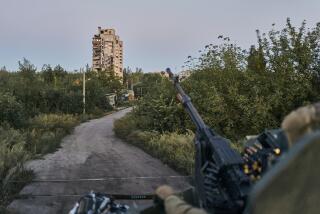Kosovars Dispute Officials on Shootout
- Share via
KOSOVSKA MITROVICA, Yugoslavia — In a sign of just how deep distrust remains in Kosovo, ethnic Albanians on the streets of this bitterly divided city Monday flatly rejected official accounts of what happened in a gun battle between snipers and international peacekeepers.
Two French soldiers were wounded by sniper fire here Sunday. Multinational forces responded to the fire, and peacekeeping officials said they shot one ethnic Albanian sniper dead and captured at least one more who was injured.
Forty people were arrested in connection with the violence, including 39 ethnic Albanians and one Serb, the peacekeeping force, known as KFOR, said Monday. Some of those arrested were suspected of being former members of the rebel Kosovo Liberation Army, KFOR said.
On Sunday, KFOR reported that at least two snipers had been wounded. It was not clear why the number changed Monday.
Ethnic Albanian men such as Ramadan Kelmendi, 47, an unemployed former executive of a battery factory, are convinced that the official version of Sunday’s events on the northern, Serb-dominated side of the city has everything backward.
“The French, to justify their act, are saying [the dead man] was a sniper,” Kelmendi said as a crowd of men around him nodded agreement.
“He was just a citizen who wanted to go to visit his family, who were over there. None of the [Albanian-language] media are saying he was a sniper,” Kelmendi said.
About 3,000 people turned out Monday for the funeral of the dead man, 35-year-old Avni Haradinaj. Mourners said he was a former Kosovo Liberation Army fighter.
Kelmendi, still winning agreement from those around him on the sidewalk, claimed that the two injured French soldiers had been shot by Serbs.
The reaction of men like Kelmendi and those around him is a sign of just how intractable the problem of this divided city has become. Ordinary people on both sides view every event through a prism of hatred and distrust.
While Kosovska Mitrovica’s north side is dominated by Serbs, its southern sector is dominated by ethnic Albanians. The entire city is patrolled by international peacekeepers whose numbers and firepower have been beefed up since the latest wave of ethnic violence erupted earlier this month.
Most ethnic Albanians believe that Serbs want to partition Kosovo at the Ibar River, which splits the city. Most Serbs believe that ethnic Albanians want to drive them away from their enclave here, which abuts the main part of Serbia.
International authorities say they will continue to press the two groups to live side by side. U.N. mission chief Bernard Kouchner and German Gen. Klaus Reinhardt, KFOR’s commander, planned to announce new measures today beefing up security in Kosovska Mitrovica and introducing additional programs to press the two communities to coexist, U.N. spokeswoman Nadia Younes said.
Ever since North Atlantic Treaty Organization troops, which form the core of KFOR, entered Kosovo last June after NATO’s 78-day bombing campaign against Yugoslavia, French forces have been responsible for security here. In recent days, British, German, Italian and Danish reinforcements have been sent in.
The expanded deployment has not stemmed a continuing exodus of ethnic Albanians from the city’s north side. About 2,500 were still living there surrounded by Serbs at the end of January, according to the Office of the U.N. High Commissioner for Refugees. The agency estimates that more than 1,000 have fled since the latest wave of inter-ethnic violence erupted Feb. 3.
Ferit Zahiti, 46, his wife and their three small children were among those who fled the Serb-dominated part of the city Monday.
“I tried to protect my home but I couldn’t anymore,” Zahiti said shortly after crossing a bridge over the Ibar. “The children were screaming all the time. Last night, [Serbs] came and tried to break my door. Starting from last night, I asked for aid five times. I called the [U.N.] police. I called KFOR. Nobody came. The Serbs kept banging my door. I asked for help this morning too.”
When the family finally fled with a few belongings in light baggage and plastic bags, Serbs threw stones at them, Zahiti said.
“They just kept swearing at me,” he said. “They were yelling at us: ‘Get out of here! Get out of here!’ ”
More to Read
Sign up for Essential California
The most important California stories and recommendations in your inbox every morning.
You may occasionally receive promotional content from the Los Angeles Times.













